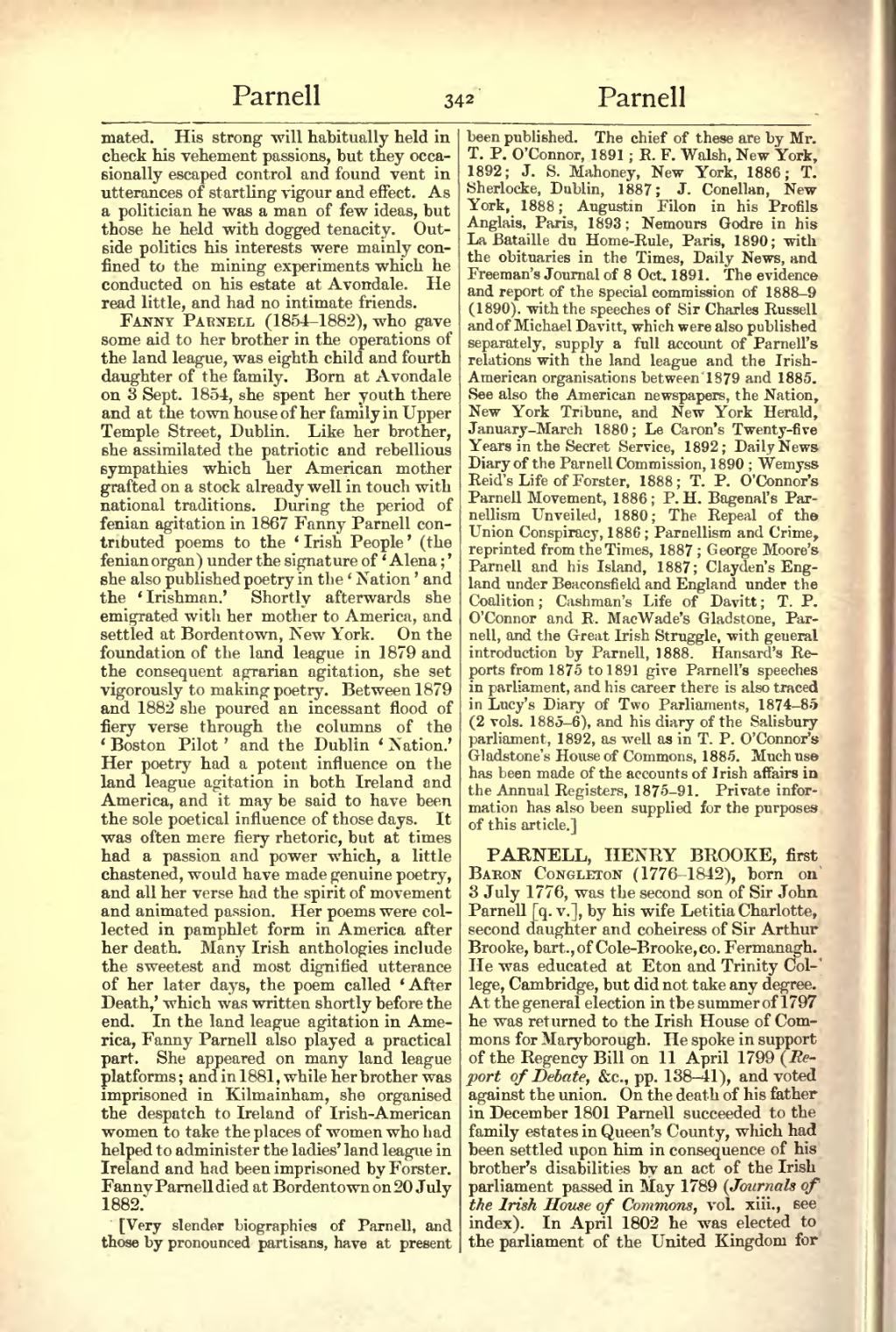mated. His strong will habitually held in check his vehement passions, but they occasionally escaped control and found vent in utterances of startling vigour and effect. As a politician he was a man of few ideas, but those he held with dogged tenacity. Outside polities his interests were mainly confined to the mining experiments which he conducted on his estate at Avondale. He read little, and had no intimate friends.
Fanny Parnell (1854-1882), who gave some aid to her brother in the operations of the land league, was eighth child and fourth daughter of the family. Born at. Avondale on 3 Sept. 1854, she spent her youth there and at the town house of her family in Upper Temple Street, Dublin. Like her brother, she assimilated the patriotic and rebellious sympathies which her American mother grafted on a stock already well in touch with national traditions. During the period of fenian agitation in 1867 Fanny Parnell contributed poems to the 'Irish People' (the fenian organ) under the signature of 'Alena;' she also published poetry in the 'Nation' and the 'Irishman.' Shortly afterwards she emigrated with her mother to America, and settled at Bordentown, New York. On the foundation of the land league in 1879 and the consequent agrarian agitation, she set vigorously to making poetry. Between 1879 and 1882 she poured an incessant flood of fiery verse through the columns of the 'Boston Pilot' and the Dublin 'Nation.' Her poetry had a potent influence on the land league agitation in both Ireland and America, and it may be said to have been the sole poetical influence of those days. It was often mere fiery rhetoric, but at times had a passion and power which, a little chastened, would have made genuine poetry, and all her verse had the spirit of movement and animated passion. Her poems were collected in pamphlet form in America after her death. Many Irish anthologies include the sweetest and most dignified utterance of her later days, the poem called 'After Death,' which was written shortly before the end. In the land league agitation in America, Fanny Parnell also played a practical part. She appeared on many land league platforms; and in 1881, while her brother was imprisoned in Kilmainham, she organised the despatch to Ireland of Irish-American women to take the places of women who had helped to administer the ladies' land league in Ireland and had been imprisoned by Forster. Fanny Parnell died at Bordentown on 20 July 1882."
[Very slender biographies of Parnell, and those by pronounced partisans, have at present been published. The chief of these are by Mr. T. P. O'Connor, 1891; B. F. Walsh, New York, 1892; J. S. Mahoney, New York, 1886; T. Sherlocke, Dublin, 1887; J. Conellan, New York, 1888; Augustin Filon in his Profils Anglais, Paris, 1893; Nemours Godre in his La Bataille du Home-Rule, Paris, 1890; with the obituaries in the Times, Daily News, and Freeman's Journal of 8 Oct. 1891. The evidence and report of the special commission of 1888-9 (1890). with the speeches of Sir Charles Russell and of Michael Davut, which were also published separately, supply a full account of Parnell's relations with the land league and the Irish American organisations between 1379 and 1885. See also the American newspapers, the Nation, New York Tribune, and New York Herald, January-March 1880; Le Caron's Twenty-fire Years in the Secret Service, 1892; Daily News Diary of the Parnell Commission, 1890; Wemyss Reid's Life of Forster, 1888; T. P. O'Connor's Parnell Movement, 1886; P. H. Bagenal's Parnellism Unveiled, 1880; The Repeal of the Union Conspiracy, 1886; Parnellism and Crime, reprinted from the Times, 1887; George Moore's Parnell and his Island, 1887; Clayden's England under Beaconsfield and England under the Coalition; Cashman's Life of Davitt; T. P. O'Connor and E. MacWade's Gladstone, Parnell, and the Great Irish Struggle, with general introduction by Parnell, 1888. Hansard's Reports from 1875 to 1891 give Parnell's speeches in parliament, and his career there is also traced in Lucy's Diary of Two Parliaments, 1874-85 (2 vols. 1880-6), and his diary of the Salisbury parliament, 1892, as well as in T. P. O'Connor's Gladstone's House of Commons, 1885. Much use has been made of the accounts of Irish affairs in the Annual Registers, 1875-91. Private information has also been supplied for the purposes of this article.]
PARNELL, HENRY BROOKE, first Baron Congleton (1776–1842), born on 3 July 1776, was the second son of Sir John Parnell [q. v.], by his wife Letitia Charlotte, second daughter and coheiress of Sir Arthur Brooke, bart., of Cole-Brooke, co. Fermanagh. He was educated at Eton and Trinity College, Cambridge, but did not take any degree. At the general election in the summer of 1797 he was returned to the Irish House of Commons for Maryborough. He spoke in support of the Regency Bill on 11 April 1799 (Report of Debate, &c, pp. 138-41), and voted against the union. On the death of his father in December 1801 Parnell succeeded to the family estates in Queen's County, which had been settled upon him in consequence of his brother's disabilities by an act of the Irish parliament passed in May 1789 (Journals of the Irish House of Commons, vol. xiii., see index). In April 1802 he was elected to the parliament of the United Kingdom for
